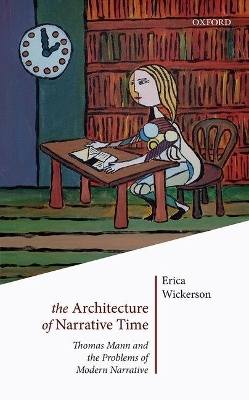
The Architecture of Narrative Time
Thomas Mann and the Problems of Modern Narrative
Seiten
2017
Oxford University Press (Verlag)
978-0-19-879327-4 (ISBN)
Oxford University Press (Verlag)
978-0-19-879327-4 (ISBN)
Scholars and students of modern literature; anyone with an interest in the work of Thomas Mann.
Time matters to all of us. It dominates everyday discourse: diaries, schedules, clocks, working hours, opening times, appointments, weekdays and weekends, national holidays, religious festivals, birthdays, and anniversaries. But how do we, as unique individuals, subjectively experience time? The slowness of an hour in a boring talk, the swiftness of a summer holiday, the fleetingness of childhood, the endless wait for pivotal news: these are experiences to which we all can relate and of which we commonly speak. How can a writer not only report such experiences but also conjure them up in words so that readers share the frustration, the excitement, the anticipation, are on tenterhooks with a narrator or character, or in melancholic mourning for a time long-since passed, which we never experienced ourselves?
Erica Wickerson suggests that the evocation of subjective temporal experience occurs in every sentence, on every page, at every plot turn, in any narrative. The Architecture of Narrative Time offers a new template for understanding narrative time that combines close readings with analysis of the structural overview. It enables new ways of reading Thomas Mann; but also new ways of conceptualising narrative time in any literary work, not only in Mann's fiction and not only in texts that foreground the narration of time. The range of Mann's novels, novellas, and short stories is compared with other nineteenth- and twentieth-century works in German and in English to suggest a comprehensive approach to considering time in narrative.
Time matters to all of us. It dominates everyday discourse: diaries, schedules, clocks, working hours, opening times, appointments, weekdays and weekends, national holidays, religious festivals, birthdays, and anniversaries. But how do we, as unique individuals, subjectively experience time? The slowness of an hour in a boring talk, the swiftness of a summer holiday, the fleetingness of childhood, the endless wait for pivotal news: these are experiences to which we all can relate and of which we commonly speak. How can a writer not only report such experiences but also conjure them up in words so that readers share the frustration, the excitement, the anticipation, are on tenterhooks with a narrator or character, or in melancholic mourning for a time long-since passed, which we never experienced ourselves?
Erica Wickerson suggests that the evocation of subjective temporal experience occurs in every sentence, on every page, at every plot turn, in any narrative. The Architecture of Narrative Time offers a new template for understanding narrative time that combines close readings with analysis of the structural overview. It enables new ways of reading Thomas Mann; but also new ways of conceptualising narrative time in any literary work, not only in Mann's fiction and not only in texts that foreground the narration of time. The range of Mann's novels, novellas, and short stories is compared with other nineteenth- and twentieth-century works in German and in English to suggest a comprehensive approach to considering time in narrative.
Erica Wickerson is a Research Fellow at St John's College, Cambridge, and has published on writers ranging from ETA Hoffmann, Gérard de Nerval, Theodor Storm, and Ruth Klüger, as well as Thomas Mann. She is currently working on a project which explores the interaction of space and time in works by Franz Kafka in comparison with a range of other writers, artists, and film makers spanning from the nineteenth century to the present.
Introduction
1: Space
2: Performance
3: Symbols and Motifs
4: Myth
5: History
Conclusion
Bibliography
| Erscheinungsdatum | 20.06.2017 |
|---|---|
| Zusatzinfo | 8 black and white illustrations |
| Verlagsort | Oxford |
| Sprache | englisch |
| Maße | 147 x 222 mm |
| Gewicht | 418 g |
| Themenwelt | Geisteswissenschaften ► Sprach- / Literaturwissenschaft ► Anglistik / Amerikanistik |
| Geisteswissenschaften ► Sprach- / Literaturwissenschaft ► Literaturwissenschaft | |
| ISBN-10 | 0-19-879327-8 / 0198793278 |
| ISBN-13 | 978-0-19-879327-4 / 9780198793274 |
| Zustand | Neuware |
| Haben Sie eine Frage zum Produkt? |
Mehr entdecken
aus dem Bereich
aus dem Bereich
Poetik eines sozialen Urteils
Buch | Hardcover (2023)
De Gruyter (Verlag)
59,95 €
Buch | Softcover (2024)
belleville (Verlag)
20,00 €


